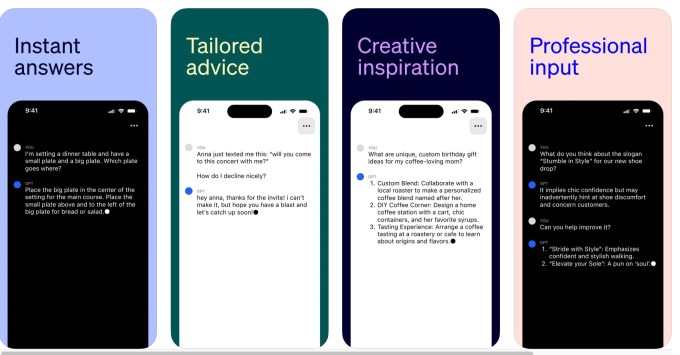ChatGPT is going mobile. Today, OpenAI announced the launch of an official iOS app that allows users to access its popular AI chatbot on the go, months after the App Store was filled with dubious, unofficial services. The new ChatGPT app will be free to use, free from ads, and will allow for voice input, the company says, but will initially be limited to U.S. users at launch.
Like its desktop counterpart, the ChatGPT app allows users to interact with an AI chatbot to ask questions without running a traditional web search, plus get advice, find inspiration, learn, research, and more. Given the issues with Apple’s own voice assistant, Siri, and Apple’s own lack of AI progress, the new release could push more users to try ChatGPT on their phones as their main mobile helper. The launch could also potentially impact Google, as the search engine today benefits from being the default search engine in Safari on Apple’s iPhone.
When using the mobile version of ChatGPT, the app will sync your history across devices — meaning it will know what you’ve previously searched for via its web interface, and make that accessible to you. The app is also integrated with Whisper, OpenAI’s open source speech recognition system, to allow for voice input.
ChatGPT Plus subscribers will be able to access GPT-4’s capabilities through the new app, OpenAI says, in addition to receiving early access to new features and faster response times, the company notes in its announcement. The subscription offering was launched in February and costs $20 per month for the upgraded features, including access to ChatGPT even during peak times.
The company says the rollout of the new app will start in the U.S. today but it will expand to other countries in the “coming weeks.” An Android version is also teased as “coming soon.”

Image Credits: OpenAI (App Store screenshot)
OpenAI had been rumored to be working on a mobile client, according to an earlier article by Semafor, which the company had then declined to comment on.
The ChatGPT app’s launch comes at a time when major tech companies, including Google, Microsoft, and Facebook are experimenting with AI, and, in the case of Google and Microsoft, also integrating AI capabilities into their search engines — the latter through an expensive partnership with OpenAI, in fact. But being able to access ChatGPT directly on mobile outside of a search engine or browser could potentially shake up how people today use their phones to search and connect with information.
One thing that could be compelling about OpenAI’s mobile app versus search apps’ AI integrations is its ad-free nature. OpenAI alludes to this in its blog post, noting that users can get instant answers “without sifting through ads or multiple results.” The statement is a subtle burn on its own partner, as Bing is already slipping ads into its AI-powered Bing Chat, in addition to somewhat snubbing search engines.
Even ChatGPT’s App Store description touts its ad-free nature, as that’s one of few features it mentions alongside the ability to sync your history and access to newest models from OpenAI.
The app’s arrival also comes only days after Google lifted the waitlist from its own AI chatbot, Bard, which it announced during this month’s Google I/O developer conference was now available in English.
There does seem to be some consumer demand for ChatGPT and AI on the iPhone. Recent research from app store intelligence provider data.ai found that the top 10 mobile AI apps had already generated over $14 million in consumer spending this year, as of late March, and consumers’ average daily spending was up 11% over February.
OpenAI launches an official ChatGPT app for iOS by Sarah Perez originally published on TechCrunch








